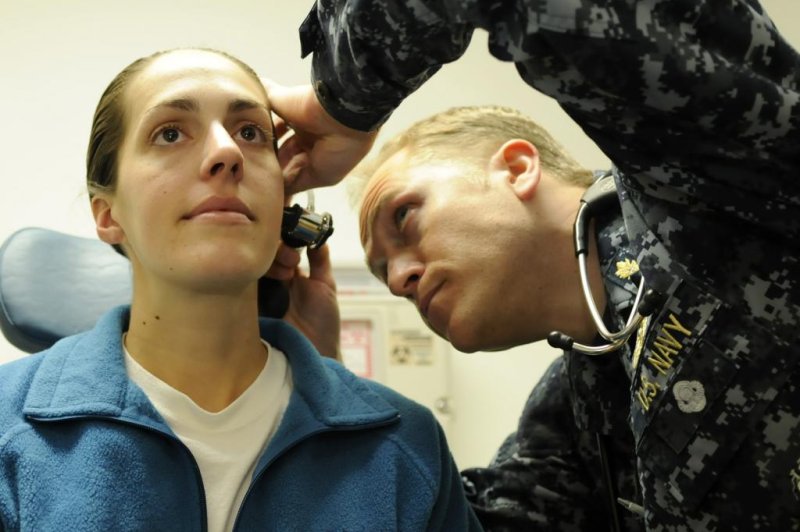1 of 2 | Tinnitus -- persistent ringing in the ears that's a potential side effect of COVID-19 vaccination for some people -- affects more than 740 million adults globally. U.S. Navy photo by Mass Communication Specialist 2nd Class Chelsea A. Radford
Aug. 8 (UPI) -- Tinnitus -- persistent ringing in the ears that's a potential side effect of COVID-19 vaccination for some people -- affects more than 740 million adults globally, a new study says. And it is perceived as a major problem by more than 120 million people.
Given the sometimes debilitating condition's widespread impact on the population, "greater effort should be devoted to boost research" on tinnitus, concludes the research paper published Monday in JAMA Neurology.
According to the meta-analysis, 14.4% of adults experienced some type of tinnitus. while 2.3% experienced a severe form of the condition.
The estimates of tinnitus' prevalence, while not significantly differing by sex, increased with age: steadily rising from 10% of young adults to 14% of middle-aged adults and 24% of older adults, the researchers paper said.
Data are important in trying to get a firmer handle on the issues surrounding tinnitus, Dr. Gregory Poland, professor of medicine and infectious diseases and director of the Mayo Clinic's Vaccine Research Group, told UPI in a phone interview.
Poland developed tinnitus, which he describes as a "life-altering event," after receiving a COVID-19 vaccination.
"It started about an hour and a half after my second dose. I was driving home ... and I almost veered into the next lane" when the steady noise began, he said.
He pushed it into the background, got his first booster dose, "and it got significantly louder and higher pitched." He said it's like "loud humming from a fluorescent light."
Poland said can't go back to sleep if he awakens during the night, or go to restaurants with loud music or conversation. And he saddens when thinking he might never know silence again.
Poland said that while he's been able to put the noise in the background at times, he knows people unable to do this may become anxious and depressed, and the condition may become intolerable to them.
He's heard this from them -- people who have seen news accounts of his condition -- and tried to offer encouragement that new research will bring hope.
Poland said he understands his situation is "laughably ironic" and stresses he thinks people must get protection for COVID-19.
"In no way do I want to dissuade people from getting COVID vaccination." But people want to know the risks to make informed choices.
"You want to make decisions based on data, not fear," he said.
Even he backed off when his first booster shot made the tinnitus worse, not returning for his second booster.
"I can't take the risk of this becoming intolerable," he said.
A year ago, the Food and Drug Administration and the European Medicines Agency added tinnitus as a potential side effect of the Johnson and Johnson vaccine.
The World Health Organization is also reviewing reports of sudden hearing problems as well as dizziness following COVID-19 vaccination.
But U.S. regulators didn't find a causal relationship between tinnitus and vaccines by Pfizer and Moderna, which use messenger RNA technology.
And, while the Centers for Disease Control and Prevention's Vaccine Safety Office "jumped all over" investigating myocarditis and pericarditis after mRNA COVID-19 vaccination, Poland said, "we have not been able to get [the CDC] interested" in tinnitus.
He added: "There's almost no research because it's not something you can measure, it's not something you can image. There are no biomarkers and no evidence-based treatment for it."















